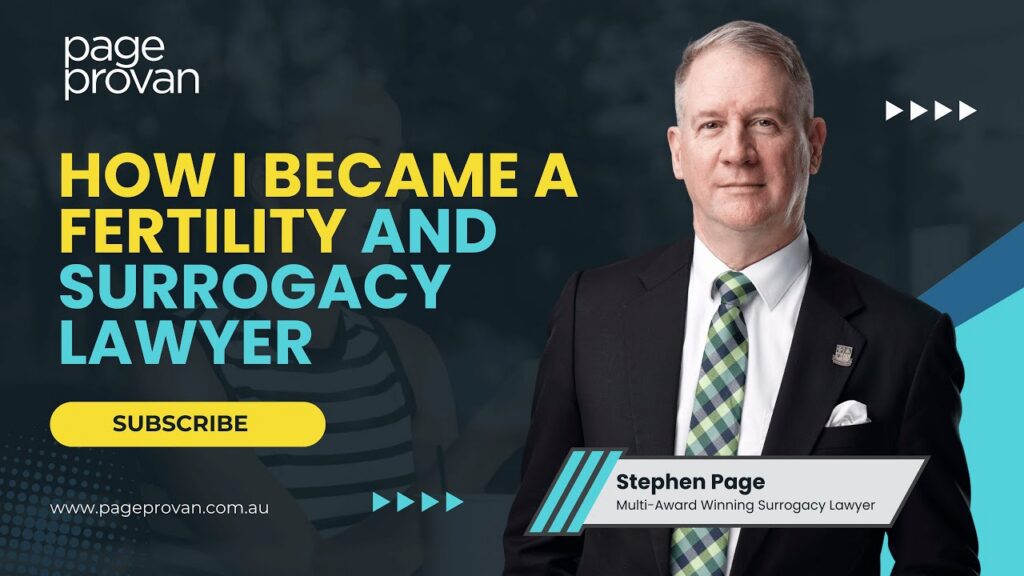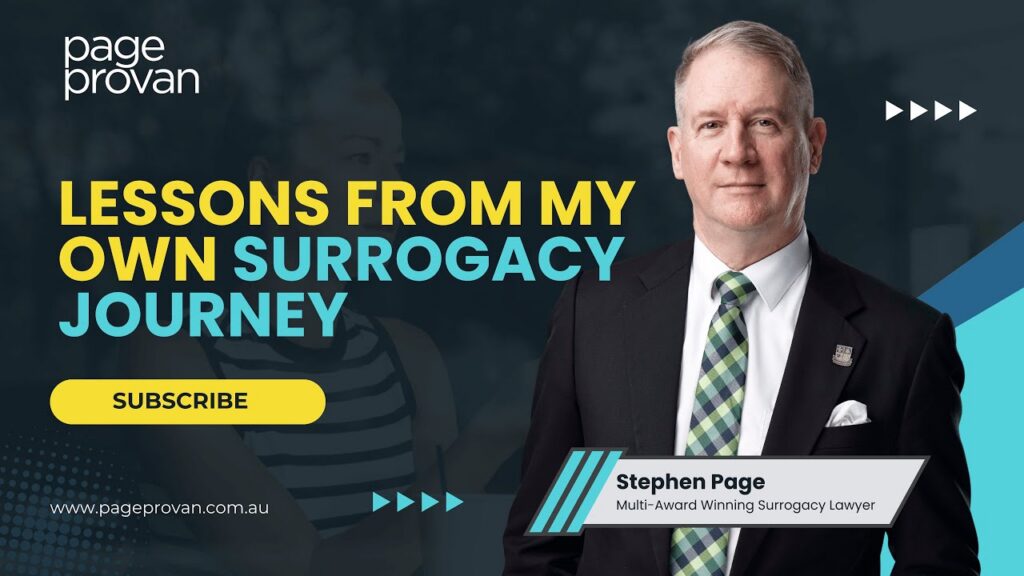Don’t Make this BIG Surrogacy Mistake
I’m Stephen Page from Page Provan and Family Fertility Lawyers. I’ve been advising families on surrogacy since 1988 and, over the years, I’ve worked on more than 2,000 surrogacy journeys — more than any other lawyer in the country. In that time I’ve seen the joy surrogacy can bring and the heartbreak that can follow when legal steps are botched. In this article I want to describe two real court cases that show why hiring a lawyer who truly understands surrogacy law matters. These are not hypothetical problems — they are mistakes that have delayed families, cost thousands of dollars, and even led to criminal and professional investigations.
Why this matters
Surrogacy law in Australia is complex, varies between states, and requires strict compliance with particular procedural and evidentiary steps. Getting the legal work wrong can mean: parental orders refused or delayed, extra expensive assessments, investigations by the Director of Public Prosecutions (DPP), referrals to legal regulators, and needless stress for intended parents, surrogates and children.
Below I outline two instructive cases and then provide practical, actionable advice on how to choose a surrogacy lawyer, red flags to watch for, and what to do if you discover a mistake has already been made.
Case study 1 — REN (Supreme Court of New South Wales): a counselling compliance trap
What happened: The REN case illustrates how a seemingly small procedural error can derail a final court order. Under the New South Wales surrogacy legislation, two separate counselling processes are required after a child is born: (1) relinquishment counselling for the surrogate (and her partner where relevant), and (2) an independent assessment report focused on the best interests of the child. These are distinct functions and must be carried out independently.
In REN an experienced counsellor conducted both the relinquishment counselling and the independent assessment report on the same day. That might sound efficient, but the law requires independence between those two processes so the best-interests assessment is unbiased and unconnected to the counselling session. When the matter came before the judge, it was obvious the dual-role approach was non-compliant.
The parties attempted to fix the problem by commissioning a new independent assessment report. But because the same counsellor had already performed the relinquishment counselling on the same day, the judge found the subsequent report still lacked the necessary independence. The court refused to make the parental order and required a proper independent report. The legal bill to correct the error was significant — the counsellor’s fees alone were about $4,000 — and the family faced delays and additional procedural hurdles.
Lesson: A lawyer who specialises in surrogacy would have anticipated the requirement for two separate, independent elements and ensured they were carried out correctly the first time. Compliance with technical requirements is not optional — it’s the foundation of a successful surrogacy pathway.
Case study 2 — Lloyd & Compton (Family Court): the high cost of incorrect characterisation
What happened: Lloyd & Compton involved a Brisbane couple who used a surrogate in North Cyprus. When the child was born, the wife was not listed on the birth certificate. The intended legal pathway in Queensland was to obtain leave from the Family Court for a stepparent adoption so the wife could become a legal parent.
The couple’s lawyer filed material in the Family Court that, on its face, described a commercial surrogacy arrangement. Commercial surrogacy is an offence in many Australian jurisdictions. Once that characterisation was on the court record, the judge had no choice but to consider whether criminal offences may have been committed. The court referred the couple’s case to the Director of Public Prosecutions for investigation and also referred the lawyer to the New South Wales Legal Services Commission. On the face of the judgment the judge was critical of the lawyer for not having produced supporting evidence — the lawyer was judged not to have “come up with the goods.”
Lesson: International surrogacy raises particular risks: different jurisdictions have different rules; factual evidence of the arrangement (contracts, payments, communications) must be assembled carefully; and careless wording in affidavits can expose clients to criminal investigation and a lawyer to regulatory scrutiny. Again, a surrogacy specialist would have known how to frame the case, what evidence was necessary, and how to avoid triggering referrals and investigations.
Why do these errors happen
There are a few recurring reasons I see these mistakes:
- Complex, state-specific rules: Surrogacy legislation differs across Australian states and territories (and between countries if it’s international surrogacy). Small differences — such as specific counselling rules in NSW — are critical.
- Procedural technicalities: Courts demand strict compliance with forms, reports and timing. Courts do not accept expedient shortcuts when a child’s legal status is at stake.
- Mischaracterisation of arrangements: Describing an arrangement as “commercial” without clear evidence can trigger criminal reviews. Lawyers must be precise and cautious with language in affidavits.
- Overreliance on credentials: Having an accreditation as a family law specialist is valuable, but it does not automatically mean expertise in surrogacy law. Surrogacy requires specialist experience beyond general family law practice.
How to choose the right surrogacy lawyer — practical checklist
Choosing the right lawyer for your surrogacy journey is one of the most important decisions you will make. Below are practical questions and checks you should use when interviewing a lawyer:
- How many surrogacy matters have you handled? Ask for a number and for the timeframe. I recommend a lawyer who has acted in many commercial and non-commercial surrogacy matters over several years.
- What proportion is domestic versus international? International surrogacy requires different expertise (immigration, foreign birth registrations, criminal law risk, foreign law compliance).
- Can you provide references or anonymised case studies? Reputable specialists should be able to provide references from previous clients or descriptions of how they handled similar cases.
- Are you familiar with the relevant state legislation and court practice? Ask them to cite the specific sections and procedural steps (e.g., NSW requirement for independent assessment reports; Queensland stepparent adoption leave).
- Do you work with accredited counsellors experienced in surrogacy? A good lawyer will have a network of independent counsellors and experts and will be able to explain how they ensure independence.
- What is your strategy for gathering and presenting evidence to the court? Evidence planning is essential — you need to know what affidavits, foreign documents, and witness statements will be required.
- Do you have experience dealing with the DPP or with Legal Services Commission matters? If something goes wrong, having a lawyer who understands investigator expectations and regulatory processes is invaluable.
- Are fees and likely costs provided in writing? Ask for a written estimate and a clear explanation of additional potential costs (e.g., expert reports, counselling fees, translation/legalisation of foreign documents).
- Do they offer a second opinion or collaborate with another surrogacy specialist? Willingness to get another specialist involved is often a sign of experience and humility.
Red flags — what to avoid
- Lawyers who cannot or will not give a clear number of surrogacy cases they have acted in.
- Assurances like “Don’t worry, I’ve done this before” without documentation or references.
- Failure to demonstrate knowledge of the specific state or international rules that apply to your case.
- Reluctance to put a clear plan and costs in writing.
- Using the same counsellor for independent assessment and relinquishment counselling without explanation — that should prompt immediate questions.
- Any suggestion that necessary steps can be “fast-tracked” by combining roles or skipping reports — that is a shortcut to trouble.
If you suspect your surrogacy matter has been mishandled — immediate steps
If you realise a compliance issue (like the REN example) or a problematic affidavit (as in Lloyd & Compton) has already been filed, act quickly:
- Seek an urgent second opinion from a surrogacy specialist who is independent of your current lawyer.
- Document all communications, invoices, and reports you have received. Preserve emails, texts and files.
- If you are before a court, advise the judge promptly through your new counsel — courts appreciate candid disclosure and remediation steps.
- Commission the correct independent assessments or reports immediately and ensure they meet legislative standards.
- If criminal exposure is a possibility, get specialist criminal or regulatory advice; do not attempt to handle this through general correspondence.
- If you believe your lawyer acted incompetently, seek advice about making a complaint to your state’s legal services regulator. But prioritise fixing the legal problem first.
Final thoughts
Surrogacy is a beautiful but highly technical area of law. The consequences of a mistake are not just legal — they affect families, children and the people who carried those children. My message is simple and direct: if you are undertaking surrogacy, go to a lawyer who knows what they’re doing. Don’t accept that someone “knows enough” — check their track record, ask the hard questions, and insist on full compliance with the law.
“If you are undertaking surrogacy, which is a complex area, go to a lawyer who knows what they’re doing.”
As someone who is not only a lawyer but also a dad through surrogacy, I speak from both professional and personal experience. The right legal support will help you complete your family without unnecessary delay, cost, or risk. If you need help assessing your situation, get independent specialist advice early — it can save you thousands and protect the people you love most.












